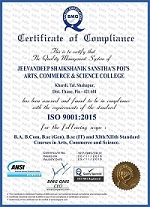
Contact Us
JSSP Arts, Commerce & Science College, Dalkhan, Khardi, Tal. Shahapur, Dist. Thane - 421601
+91 99203 39256
+91 99239 92390
,,सर्व विद्यार्थ्यांना सूचित करण्यात येते की राष्ट्रीय सेवा योजना विभागाच्या वतीने 7 दिवसीय श्रम संस्कार शिबीर आयोजित करण्यात येणार आहे. त्यासंदर्भात सभा दिनांक 13 डिसेंबर रोजी FYBA च्या वर्गात आयोजित करण्यात आली आहे तरी सर्वांनी तेथे उपस्थित राहणे अनिवार्य आहे............ All students are hereby informed that a 7-day "Shram Sanskar Shibir" is being organized by the National Service Scheme (NSS) Department. A meeting regarding this will be held on 13th December in the FYBA class. Therefore, it is mandatory for all students to be present.

The M.A. Economics (MAE) program is designed to give students a quantitative approach to economics with the flexibility to tailor the degree to fit their future goals. It offers comprehensive instruction in a wide range of areas within the discipline, including computational economics, economic analysis, and financial economics. Graduates of the program are adept in applied research and financial analysis, highly competitive on the finance sector job market, and ready for top Ph.D. programs.
The master’s program is designed to combine theoretical rigor in core areas of economics with exceptional flexibility in course requirements to encourage students to explore their academic interests. In addition to master’s-level courses, students frequently enroll in many doctoral level courses in economics, and in courses from other departments, including Political Science, Public Policy, Finance, Statistics, and Mathematics. The curriculum is intended to be completed in four semesters.
| Sem I | Sem II |
| Micro Economics | Micro Economics |
| Macro Economics | Macro Economics |
| Agriculture Economics | Agricultural Developement & Policy |
| labour Market | Industrial Relations in India |
| Sem III | Sem IV |
| International Trade : Theory and Policy | Industrial economics |
| Economics of AgriculturalProduction and Rural Markets | Project |
| Economics Of Labour Markets | International Finance |